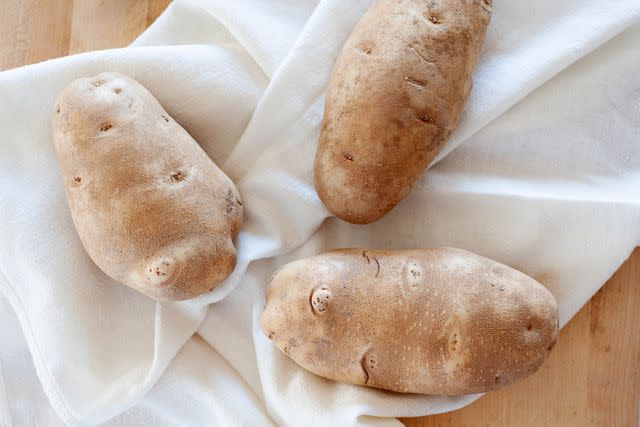The 5 Easy Ways To Prevent Potatoes From Sprouting
Food safety experts recommend that you do NOT eat sprouted potatoes. Here's what you can do to prevent them from sprouting.

Simply Recipes / Wanda Abraham
Potatoes are my favorite—they are the ultimate comfort vegetable. I love them mashed, baked, stewed, or fried. Because I eat a lot of potatoes often, I buy them in bulk and I often find them in my pantry sprouted.
In general, you shouldn’t eat sprouted potatoes because it means they’ve produced natural toxins. "Potatoes sprout when they are exposed to a warm environment, around 68°F or higher,” says registered dietitian nutritionist Rahaf Al Bochi, LD, owner of Olive Tree Nutrition, and spokesperson for the Academy of Nutrition and Dietetics. “Sprouted potatoes produce the chemical solanine in their sprouts, which can be toxic if consumed.”
If potatoes only have tiny sprouts and are still firm, you can remove the sprouts and cut off any soft spots and eat the rest of the tuber. But ideal storage conditions can make these popular vegetables last much longer.

5 Ways To Prevent Potatoes From Sprouting
1. Store potatoes away from heat and light:
Because light, heat, and humidity can make your spuds sprout faster, it’s best to keep your potatoes in a cool, dry, dark place. Good options include the pantry or in a drawer, as opposed to on the counter or on a windowsill where daylight can have an effect.
2. Store potatoes in the fridge:
New research has challenged long-followed storage recommendations, so you may also consider keeping them in the fridge.
“While experts used to advise against storing potatoes in the refrigerator, as cold temperatures were thought to increase acrylamide-forming sugars, a potential carcinogen, in potatoes, new research says this just isn't true,” says Kelsey Kunik, RDN and nutrition advisor for Zenmaster Wellness.
The United Kingdom's Food Standards Agency (FSA) says storing potatoes in the fridge is safe. Keeping them in the refrigerator can extend the shelf life of potatoes by 3 to 4 months.
3. Transfer potatoes out of the plastic bag:
Potatoes often come in plastic bags, which aren’t ideal for storage. Instead swap the plastic for a paper bag, mesh bag, or ventilated bin. A plastic bag can encourage moisture, which can lead to mold and rotting.
4. Store potatoes away from certain fruits and vegetables:
It also matters what company your potatoes keep. Don’t store them near apples, avocados, tomatoes, or other types of produce that release ethylene. That’s a gas produced by some produce that can cause sensitive fruits and vegetables to ripen more quickly.
5. Remove the sprouted or rotten potato:
One sprouted potato can have an impact on the rest of the bag. “If you notice that one potato goes bad, remove it from the bunch as bacteria and mold can easily spread to the other potatoes,” says Kunik.

How to Pick the Best Potatoes
When you’re shopping, choose potatoes that are firm and don’t have any bruises or spots. Avoid ones that have a green tinge. That’s chlorophyll which indicates that the potato has been exposed to light. And when potatoes have been exposed to light, that’s where the toxin solanine can become harmful when concentrated.
“Select ones with barely visible eyes, which is the small indentation which the sprouts and buds emerge from,” says Kunik. “If the sprouts are already starting to form in these small divots, they're much more likely to form full sprouts more quickly.”

